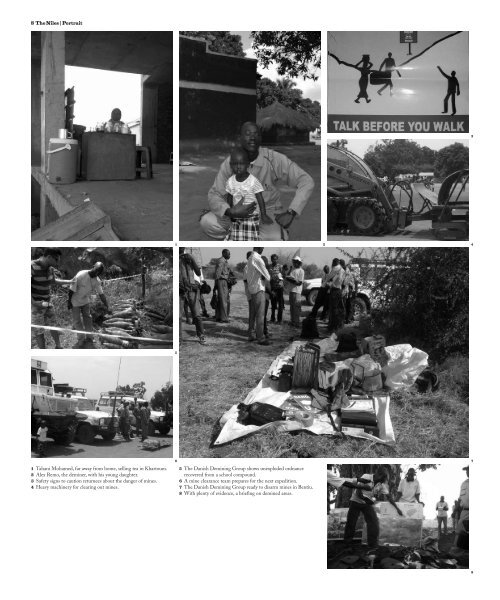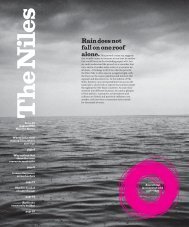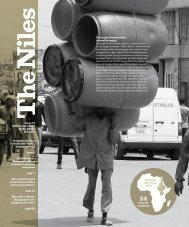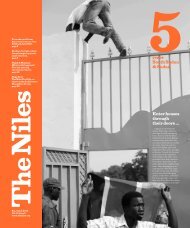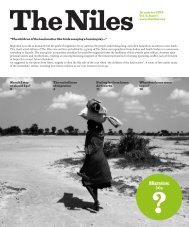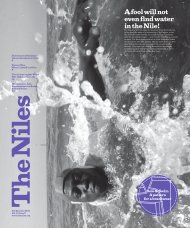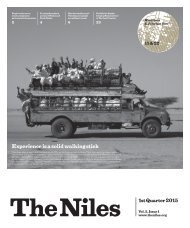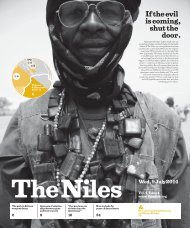Those who have no fence around their land...
...have no enemies. Land has always been more than a matter of square meters for the Sudanese and South Sudanese. The multitude of local languages spoken in the two countries include a vast array of words for land. The precise meaning of the word varies from language to language – but the core remains the same: Land is a cherished asset. This has long been recognised by international investors who lease or buy land in South Sudan and Sudan. Meanwhile the two Sudans argue over minerals and borders. But is the answer fewer fences – as the East African idiom suggests? The Niles journalists, who hail from across both countries, have tackled this highly sensitive topic and have no easy answers. But they have at least sown the seeds of fresh ideas in the third edition of The Niles. Hopefully, they will land on fertile ground.
...have no enemies. Land has always been more than a matter of square meters for the Sudanese and South Sudanese. The multitude of local languages spoken in the two countries include a vast array of words for land. The precise meaning of the word varies from language to language – but the core remains the same: Land is a cherished asset. This has long been recognised by international investors who lease or buy land in South Sudan and Sudan. Meanwhile the two Sudans argue over minerals and borders. But is the answer fewer fences – as the East African idiom suggests? The Niles journalists, who hail from across both countries, have tackled this highly sensitive topic and have no easy answers. But they have at least sown the seeds of fresh ideas in the third edition of The Niles. Hopefully, they will land on fertile ground.
You also want an ePaper? Increase the reach of your titles
YUMPU automatically turns print PDFs into web optimized ePapers that Google loves.
8 The Niles | Portrait<br />
Portrait | The Niles 9<br />
The ground<br />
beneath<br />
<strong>their</strong> feet<br />
3<br />
Tahani Mohamed sells tea in Khartoum and wants to go home.<br />
Alex Remo digs for mines in Yei and wants to study. They <strong>have</strong><br />
never met and <strong>their</strong> paths are unlikely to cross - but they <strong>have</strong> more<br />
in common than first appears. A story of two strangers hoping for<br />
a new start.<br />
by Reem Abbas Shawkat & Ochan Hannington<br />
1<br />
2<br />
4<br />
T<br />
ahani Mohamed sits dishing out cinnamonflavoured<br />
tea, hot hibiscus and coffee to businessmen<br />
<strong>who</strong> spend <strong>their</strong> days dealing cars under<br />
the hot sun of the Sudanese capital.<br />
✒<br />
06:00 AM: Alex Remo starts his working day, digging for <strong>land</strong> mines<br />
buried in South Sudan.<br />
Tahani’s home<strong>land</strong> is still under fire. The exodus continues: Every<br />
day up to 200 people flee South Kordofan and travel to Yida refugee<br />
camp in South Sudan.<br />
Her husband remains on <strong>their</strong> farm, protecting <strong>their</strong> <strong>land</strong> and<br />
cattle, his children’s future inheritance. It is a familiar story: His<br />
wife is one among more than 2.5 million internally displaced<br />
people in Sudan.<br />
✒<br />
D<br />
isplaced people are most at risk from <strong>land</strong> mines,<br />
experts say, as they lack the local k<strong>no</strong>wledge to<br />
identify danger spots. This is a serious problem<br />
in South Sudan where an estimated 240,000 people<br />
are fleeing violence in the border states, displaced<br />
by internal-communal clashes, or <strong>have</strong> recently returned to the<br />
country following the vote for independence in 2011.<br />
Mines lurk near wells, farm <strong>land</strong> and villages. Explosives are scattered<br />
along roads - preventing displaced people from traveling to safety.<br />
1 Tahani Mohamed, far away from home, selling tea in Khartoum.<br />
2 Alex Remo, the deminer, with his young daughter.<br />
3 Safety signs to caution returnees about the danger of mines.<br />
4 Heavy machinery for clearing out mines.<br />
5<br />
6<br />
5 The Danish Demining Group shows unexploded ordnance<br />
recovered from a school compound.<br />
6 A mine clearance team prepares for the next expedition.<br />
7 The Danish Demining Group ready to disarm mines in Bentiu.<br />
8 With plenty of evidence, a briefing on demined areas.<br />
7<br />
Tea selling is one of Tahani’s new jobs. She also guards a construction<br />
site and cares for her six children alone. Two years ago<br />
she lived a different life, running a busy market restaurant in<br />
South Kordofan. But when planes came roaring overhead and<br />
bombs exploded in neighbouring settlements Tahani fled with<br />
her children. They joined thousands of displaced people <strong>who</strong> are<br />
trying to make ends meet in Khartoum.<br />
✦<br />
✒<br />
Alex is a deminer, a job few envy. Dressed in heavy protective gear<br />
and a mask, the 30 year-old works from dawn to dusk using his hands<br />
or a small shovel to locate <strong>land</strong> mines, relics of his country’s decades<br />
of civil war.<br />
Beneath scorching sun or heavy rain, Alex and his 16 colleagues<br />
unearth mines for The Development Initiative (TDI). The United<br />
Nations-funded organisation sends teams across the country,<br />
removing hidden explosives which kill hundreds of people every<br />
year and handicap many more. Their evil legacy lives on: Locals<br />
can<strong>no</strong>t grow crops, children can<strong>no</strong>t attend school and people can<strong>no</strong>t<br />
live in <strong>their</strong> homes. “As long as explosives like these are still buried,<br />
our country remains unsafe,” Alex says.<br />
✦<br />
She <strong>no</strong> longer fears for her life but Tahani faces daily hardship.<br />
“I <strong>have</strong> lost weight and I don’t feel like myself,” she says. “My children<br />
are always telling me to take them home, we don’t feel comfortable<br />
in Khartoum.”<br />
Alex and his colleagues spend four-month stints in contaminated<br />
sites across the country, places where vehicles can<strong>no</strong>t travel for fear<br />
of sparking an explosion.<br />
✒<br />
✦<br />
Alex digs up mines, unexploded ordnance and caches of munitions<br />
buried in soft fertile soils and rocky terrain. The deminers <strong>have</strong> <strong>their</strong><br />
work cut out: The UK-based Mines Advisory Group estimates that<br />
the country has 704 recorded hazardous areas. More than 80 percent<br />
of these are in Greater Equatoria and Jonglei.<br />
“Sometimes we only get to k<strong>no</strong>w how dangerous a place is after<br />
an accident has happened,” he says.<br />
“Life in Khartoum is difficult, you work so hard. We barely make<br />
it,” says Tahani <strong>who</strong> was pregnant when she relocated with her<br />
children aged 11, 8, 5, 3 and 2.<br />
✦<br />
✒<br />
A<br />
lex says concentration and strength are life-saving<br />
traits for the young deminers. The work is arduous:<br />
He carries explosives weighing up to 20 kilos<br />
across unk<strong>no</strong>wn terrain for hours. “Carrying a heavy<br />
load of explosives for a long distance is <strong>no</strong>t good.<br />
You could become tired and trip. And if you drop or hit it on something<br />
it could explode and you get killed,” says Alex, <strong>who</strong> has been doing<br />
the job for three years.<br />
He sees his family for <strong>around</strong> a fortnight after every four-month<br />
assignment.<br />
✦<br />
Tahani stayed at home during the decades of civil war. “My area<br />
was <strong>no</strong>t affected, we had a peaceful life, we heard stories about people<br />
suffering from the violence further down in the Nuba Mountains,<br />
but this time it was different, war was closer to home,” she says.<br />
Clashes between the Sudan Armed Forces and the Sudan People’s<br />
Liberation Army – North (SPLA-N) following controversial<br />
gover<strong>no</strong>rship elections left Tahani near the eye of the storm. An influx<br />
of frightened, homeless people arrived in her town. “They came<br />
to us on foot and they had <strong>no</strong>thing, we helped them survive, it was<br />
very difficult,” she says.<br />
✦<br />
Tahani gets <strong>no</strong>stalgic when she recalls her hometown near Al-<br />
Dilling, a diverse town which comprises Nubas, Tahani’s ethnic<br />
group, and others such as Hawazzma and Fellata. She remembers<br />
the queues in her restaurant and how she would run out of food<br />
at breakfast time.<br />
“Our town is beautiful, it is green and the weather is nice,” she says.<br />
Despite the danger, she plans to take her family home, back to her<br />
husband <strong>who</strong> she married when she was 13. “I really miss him. Even<br />
if I <strong>have</strong> to wait ten years, seeing him is worth the wait,” she says.<br />
✒<br />
Although his family wants him to quit his job, Alex says he has<br />
<strong>no</strong> other options. His education was scant and youth unemployment<br />
stands at more than seventy percent in South Sudan. Removing<br />
<strong>land</strong> mines has become a way of life: “My job means a lot to me.<br />
Just like any other job, I get paid. And with the wages I earn I take<br />
good care of my family.”<br />
Ever since South Sudan became a nation in its own right Alex has<br />
been scouring for <strong>land</strong> mines, aware that each job could be his last.<br />
✦<br />
Like the rest of the population on the move, Tahani’s future is beyond<br />
her control: “I don’t want war, I don’t understand why our state has<br />
to be at war for so long.”<br />
✒<br />
Alex Remo goes home after a long shift. Tomorrow at six in the<br />
morning he will carry on digging for <strong>land</strong> mines, digging soils where<br />
others are afraid to step.<br />
✦<br />
✒<br />
8


